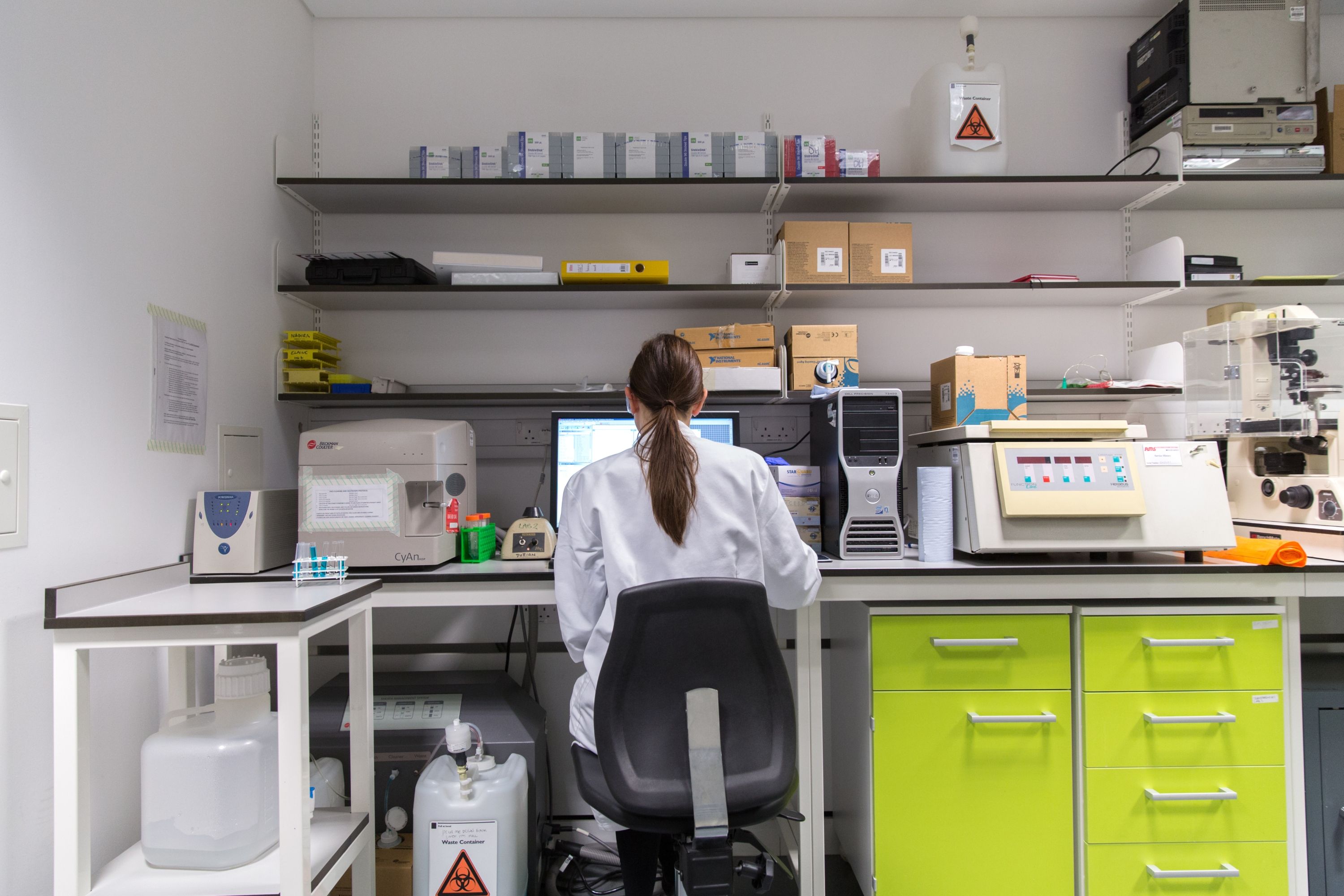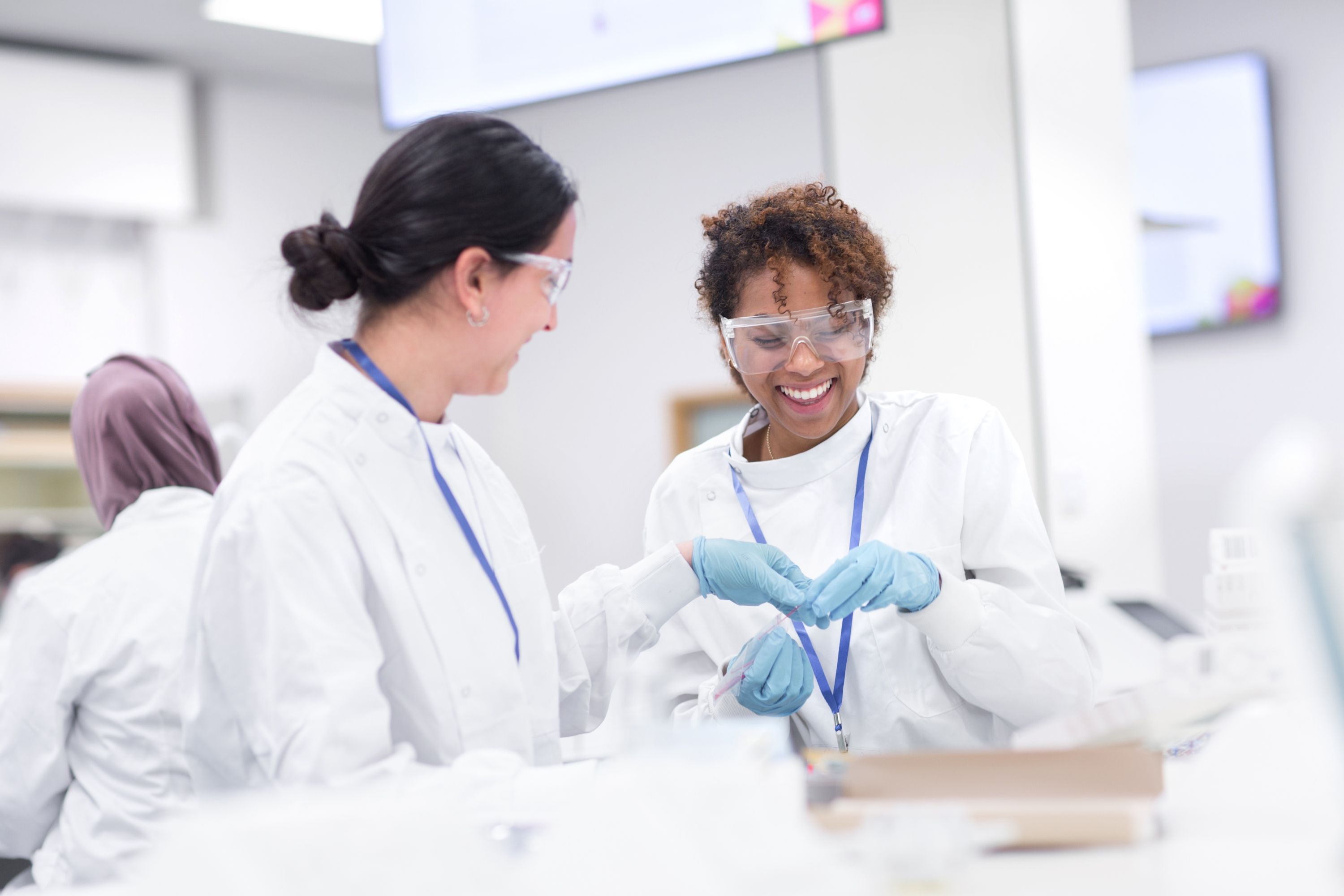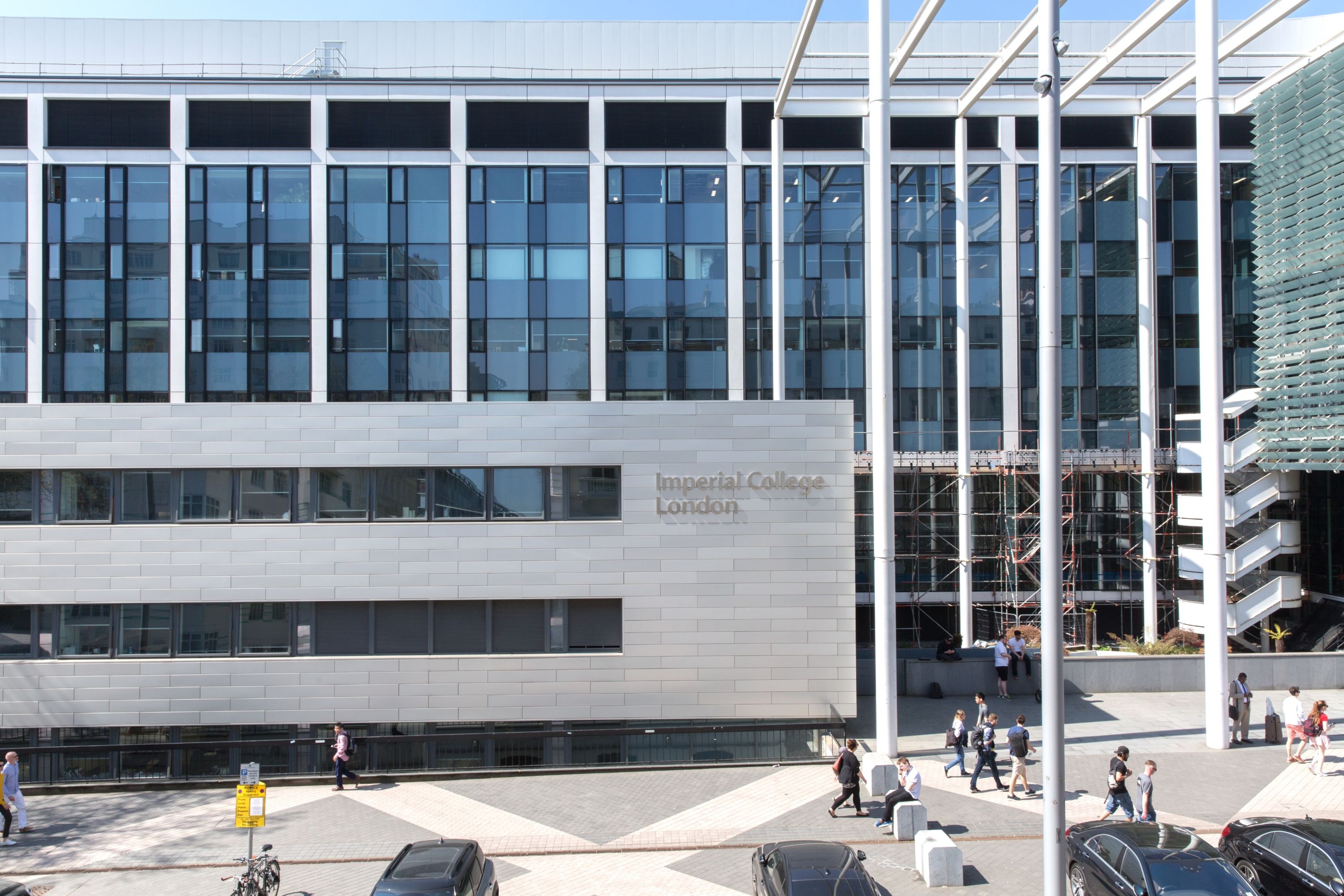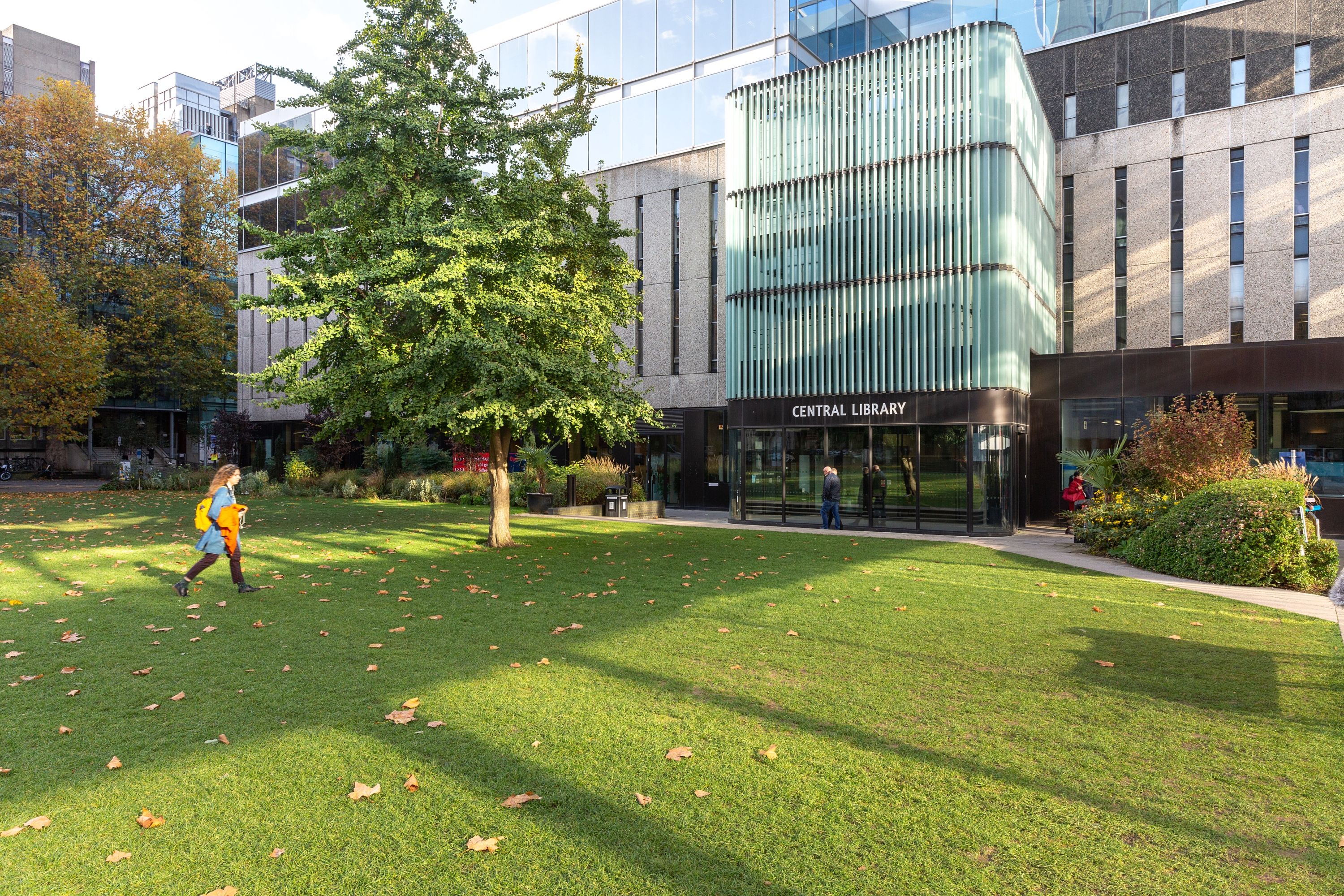How to apply for a PhD in the UK
Applying for a phd is not quite as daunting as you might think. a postgraduate student recruitment officer from the university of sussex shares his tips for putting together a phd application.


Ben Osborne
There are many different reasons for wanting to pursue a PhD – to move into an academic role at a university, to continue studying a subject you are passionate about or to further your career.
Whatever your motivation, many students are now choosing to pursue a PhD abroad. This guide will help you understand how to apply for a PhD at a UK university and answer any questions you might have around doing PhDs.
How to apply for a PhD
Application rules and methods vary for each university. The number of courses that you can apply for in a year will vary. For example, at the University of Sussex , you can apply for up to three postgraduate courses per year using the postgraduate application system.
If you are applying for more than one degree, you must submit a research proposal/statement specific to each area of study you apply for.
You can also apply to different universities to improve your chances of being accepted to a PhD course of your choosing.
What qualifications do I need?
Each PhD will have specific entry requirements and you will also need to meet a university’s general entry requirements. This may be an upper second-class undergraduate honours degree (2:1) or an equivalent international qualification. For some PhDs you may need a master’s qualification, and you may be asked to attend an interview.
International students may also be required to prove language proficiency. This will vary across institutions so do check what level universities expect before starting your application.
Applicants should always check the specific entry requirements in a university’s online prospectus before making an application.
When should I start applying?
This will depend on when your term start date is. Most research degrees will start in September but some courses offer additional entry points in January or May.
You can apply all year round for research degrees starting in September, January and May, and the deadlines for applying are usually one month before the course start date for UK applicants, and three months before for international applicants.
If you’re applying for funding from an external organisation you’ll need to be aware that they may have different deadlines for the funding application. So give yourself plenty of time to research your funding options, and ensure you know how long the application process takes.
Many universities offer a number of funded PhD opportunities and PhD scholarships for UK and international students, and it’s always worth investigating funding routes such as research councils and other organisations, both in the UK and overseas.
In some cases, it may be possible to study a PhD by distance which means you’ll be able to learn online and have virtual meetings with your supervisor.
If this is something you would be interested in doing you should check before applying whether your university can accommodate this option.
Nine things to know before doing a PhD Starting a PhD during the pandemic Studying for a part-time PhD: the challenges and the benefits Is it possible to do a three-year PhD as an international student?
How should I look for a supervisor?
Usually if you are applying for a funded project, or to a research centre or group, you will normally be asked to provide a statement explaining your suitability for working in that area, and if successful you will be allocated a supervisor.
If you wish to propose your own area of research, you need to decide on a research topic, and you will be expected to write a research proposal. In some cases you may only be required to provide a summary of academic interests and this can be used to match you to a researcher that suits you.
If you are proposing your own research topic, there may be a research database at your university that you can search, or your university will match you with a supervisor during the assessment of your application. It may be possible to request supervision by a particular member of faculty – this will be considered but not all requests can be accommodated.
If you do find a potential supervisor who matches your research area, check their online profile for indications of their doctoral supervision capacity. If they are open to doctoral applications, you can contact them directly to check their availability for supervising you.
It is a good idea to draw up a shortlist of two to three potential supervisors, and take an in-depth look into their research history. You can also find out more about your potential supervisors by looking in the reference sections of academic textbooks and searching for articles in research databases and academic blogs.
When you contact your potential supervisor, it is important to tell them something interesting about yourself, and explain your research interests and how you feel your research proposal matches their expertise.
How do I write a research proposal?
If you are proposing your own research you will need to write a strong proposal that formulates a precise, interesting research question, and establishes the relevance and value of the proposed research question in the context of current academic thinking.
You’ll need to make sure your proposal describes the data or source material your research requires, and outlines a clear and practical methodology that enables you to answer the research question and that states clearly what you hope to discover at the end of your research, and what new areas it might open up.
The precise content and structure of your research proposal will depend on your subject area, and the University of Sussex has some helpful resources on our website to guide you through the process.
How long does the application process take?
Completing an application and writing a research proposal may take some time and should not be left until just before the application deadline.
It’s not easy to give a definite idea of how long it takes to hear if your application has been successful, as it will depend on when the application is made and the nature of the specific PhD, and you would need to meet any conditions contained within the offer before you can start the PhD.
What are the associated costs?
There won’t typically be an application fee for PhDs but there are tuition fees. If a university does charge application fees they will usually be between £50-£100.
The tuition fees for students studying in the UK are set by UK Research and Innovation . Fees for international students are £18,975 for non-lab-based subjects, and £22,975 for lab-based subjects per year.
You’ll also need to factor in living costs, but there are a number of funding routes you can apply for to help with this. As well as PhD scholarships and funded research projects there are research council awards, PhD loans for those eligible, and various organisations to which international students can apply for funding, such as The Gen Foundation and Open Society Foundations.
It’s important to be aware of the costs involved, but it’s also worth remembering that the educational, career and personal benefits of PhD study can be worth it.
You may also like

.css-185owts{overflow:hidden;max-height:54px;text-indent:0px;} How to apply for a PhD in the US
Giulia Evolvi

Women in STEM: undertaking PhD research in cancer
Grace McGregor

PhD diary: Where do I begin?
Charlie Pullen
Register free and enjoy extra benefits
International Students’ Guide to Pursuing a PhD
- Katie Baker
- November 28, 2023

Pursuing a PhD program in the UK as an international student is a serious undertaking, one that can feel exciting, daunting, and confusing in equal measure; however, for those in pursuit of academic excellence, there are few better options than the UK.
The UK is steeped in rich educational heritage, is home to several world-renowned institutions, and has become a beacon for scholars across the globe, and perhaps most importantly, in this context, top UK universities are famous for offering fully funded PhDs to international students.
In this international students’ guide to pursuing a PhD in the UK, we will ease your transition into the UK academic landscape by covering everything from the entry requirements to how to apply for PhD programs to the forms of support you can expect to receive while you’re obtaining your doctoral title away from home.
PhD Program Entry Requirements for International Students
As an international student, you will need to prove your readiness to undertake doctoral research in your subject area and demonstrate your ability to communicate effectively and contribute to your chosen institution’s academic community.
The entry requirements may differ depending on your field of study and if you are applying for a fully funded scholarship. However, typically, these are the minimum requirements you will need to meet:
Academic Qualifications – Generally, you will need a master’s degree (or equivalent) relevant to the program you are applying for. Some universities may accept a first-class or upper-second-class honours degree. Research Proposal -If you are proposing your own research plan (as opposed to applying for a pre-defined project), you will need to submit a research proposal with your application. Your proposal should cover the aims and objectives of your research and highlight your research abilities, including evidence of your academic achievements.
References & Experience – To support your application, you will also need two to three references from academics familiar with your work. It may also be beneficial for certain programs to have evidence of relevant work experience
Proof of English Language Proficiency – Your International English Language Testing System (IELTS) score should be a minimum of 6.5, with a minimum of 5.5 in each element of the exam. However, Humanities doctoral students may need a higher score of 7.0 – 7.5. Using the Test of English as a Foreign Language System (TOEFL), you will need a minimum score of 90.
Interview Attendance – To assess your suitability for a PhD program in the UK, you may be asked to attend an interview, but don’t worry; UK universities make it easier for international students by conducting interviews via video conferences.

PhD Application Tips for International Students
The motto ‘Better late than never’ may work in some instances, but when pursuing a PhD program in the UK as an international student, this becomes an exception. You should begin the research and application process at least one academic year in advance to ensure all the prerequisites are met.
The research and planning phase will include researching universities, reaching out to prospective supervisors, and tailoring your personal statement and proposal for each research department.
It also is important to start thinking about Visa requirements, how you will support yourself while you study in the UK, and if you will need to undergo health checks (depending on your home country) early in the application process. Regarding your funding, you will want to research grants, scholarships, and other funding opportunities specific to international students.
Once you have met all these requirements, you have made the first significant step towards becoming a doctoral student in the UK. Always ensure you have checked the specific entry requirements for the institution and research department you are applying to join; the entry requirements and fees can vary significantly!
How to Choose a PhD Program in the UK as an International Student
The UK is home to 166 universities, of which, 103 are in the 2023 round-up of the Times Higher Education World Universities Rankings. You may feel spoilt for choice initially, but by asking the questions below, you will quickly shorten your list of options and find the best UK university to match your skills and career objectives.
- What is the calibre of the research quality?
- Which universities have suitable PhD Supervisors on their faculty?
- Which universities have the best funding opportunities for international students?
- Which universities have state-of-the-art facilities relevant to your research area?
In addition to the unique strengths and weaknesses of each university in the UK, you will also want to consider which area of the UK you would be happiest studying in. Each campus has its own culture; choose one which aligns with your preferences.
Once you have a short list of universities and PhD programs you would like to apply for, you can start your application process by drafting your proposal and CV, gathering digital and paper copies of relevant documentation, preparing for your TOEFL or IELTS tests, finalising your application, and preparing for your entry interviews. Once you have accepted an offer, don’t hesitate before starting the Visa application process.
What Support is Available for International Doctoral Students?
Universities in the UK are well-versed in hosting international PhD students; they ensure a wealth of support services are available to make the adjustment period as smooth as possible.
Most universities have dedicated offices for international students, which can provide expert guidance on everything from visas to accommodation to cultural integration to financial advice. If English isn’t your first language, you can also access free language support, which will help you polish your communication and academic writing skills.
International students are also free to utilise mentoring and wellbeing services and career services or engage with research seminars, workshops, and conferences, designed to facilitate the integration into the academic community in the UK.
Final Thoughts
After reading this International Students’ Guide to PhDs, you may have noted that significant planning and research are required, but don’t let that hold you back from getting involved with world-leading innovative research in the UK.
The UK is at the forefront of cutting-edge research in several areas; from the sciences to the humanities, research in the UK is backed by significant investment. Furthermore, UK academic institutions are microcosms of cultural diversity; they offer a rich tapestry of perspectives capable of enhancing personal and academic growth.
Other benefits of joining a UK university to acquire your doctoral title include the doors to international career opportunities globally-respected UK PhDs can open and the shorter duration of the programs, in comparison to other countries. Few students who choose the UK as their academic oyster come to regret it!
You might also like

Do You Get Paid for a PhD?
Do You Get Paid for a PhD? For many students who don’t have the luxury of never worrying about money, one of the main considerations

Where Can a PhD in Finance Take Me?
Where Can a PhD in Finance Take Me? In the dynamic world of finance, a PhD is not just an academic accolade; it’s a launchpad

Should I Do a PhD in London?
Should I Do a PhD in London? Embarking on a PhD journey is a significant decision, one that shapes your academic and professional future. Once
Enquire with us
We are here to help and to make your journey to UWS London as smooth as possible. Please use the relevant button below to enquiry about a course you would like to apply, or to clarify any questions you may have about us and our admission’s process. After you submit your enquiry, one of our advisers will get back to you as soon as possible.
Skip to content. | Skip to navigation
Personal tools
- Log in/Register Register

https://www.vitae.ac.uk/doing-research/are-you-thinking-of-doing-a-phd/how-to-apply-for-a-doctorate-in-the-uk-and-get-funding/when-and-how-to-make-an-application-for-a-uk-doctorate-1/when-and-how-to-make-an-application-for-a-uk-doctorate
This page has been reproduced from the Vitae website (www.vitae.ac.uk). Vitae is dedicated to realising the potential of researchers through transforming their professional and career development.
- Vitae members' area
When and how to make an application for a UK doctorate
Research funders and universities have varying timescales for their calls for applications. Entry to a UK doctoral programme may be available at any time of year, but many will start at the beginning of the academic year in October. It might be wise to gear your thinking and preparation towards such a starting time, i.e. about a year in advance of that.
The real starting point for action is with your selected institution/s. Generally the first formal step is to make an online application through its website – you will almost certainly find out how to do that from its postgraduate (or research) opportunities pages. An online application will enable the institution to do some checks on your potential eligibility (such as like your existing academic qualifications, nationality or immigration status and so on).
It is likely that you will need to provide some or all of the following evidence to accompany your application:
- proof of degree attainment
- academic or professional references
- sample of prior research, writing or other work
- evidence of previous research experience
- outline of your proposed research project or idea.
The last of these is something that, depending on your route, you may only work up in detail once you are in contact with a potential supervisor.
As part of the application process, provided you are eligible, you will almost certainly be interviewed by your potential supervisor and also by other department or faculty members. You may be asked to give a short presentation as part of this. For international applicants, this may be possible using Skype or other remote meeting technology, but a face-to-face interview and visit is preferable where possible.
In some cases, if your application is accepted, you may then have to apply for funding separately.
If you are an international applicant, other issues may be important such as applying for a visa and English language requirements . There are several UK sources of specific help and advice for international applicants including:
EURAXESS UK - advice for international researchers
Education UK (British Council) – advice for international students
UKCISA – the UK Council for International Student Affairs
UK Government Visas and Immigration service
Bookmark & Share
Imperial College London Imperial College London
Latest news.

Microscopic heart vessels imaged in super-resolution for first time at Imperial

Weight programme success and honours from Finland: News from Imperial

Imperial hosts inaugural research project finale for maths school students
Postgraduate doctoral admissions process
Become a doctoral student at Imperial
Find out more about applying for doctoral study as a Home student.
Applying as an international student may involve a few extra steps. Find out all you need below.
Personalise my experience
Find a doctoral course.
Explore our postgraduate doctoral courses, which give you the chance to create original knowledge in your chosen field through an intensive programme of in-depth research. Options include PhDs, integrated PhDs and professional Doctorates for working professionals.

Find a course

How to apply
Follow the steps below to apply for a postgraduate doctoral course. You may only be considered for a maximum of two courses in any one admission cycle – each will require a separate application.

Create a MyImperial account
Get started by registering a MyImperial account.
Ensure you meet the entry requirements
Explore the minimum entry requirements required for accepted qualifications - your course of interest may have higher requirements.
Take note of any deadlines
While many supervisors accept new students throughout the year, funded PhD projects may have defined deadlines for entry.
Upload all supporting documents
We won't start processing your application until you have uploaded all supporting documents.
Check your application status
Sign in to your MyImperial account at any time to check your application's progress.
- Submit your offer conditions
Before you can register for your course, pay tuition fees (if you’re self-funding), or receive a CAS to support your visa application (if you need one), you will need to show you have met all your offer conditions.
Student visa – CAS
If you need a visa to study in the UK, you'll need to provide a Confirmation of Acceptance for Studies (CAS) with your visa application. We'll issue this automatically after you have met your offer conditions.

If you need a visa to study in the UK, you'll need to provide a Confirmation of acceptance for studies (CAS) with your visa application. We'll issue this automatically after you have met your offer conditions.

Doctoral loan
A Postgraduate Doctoral Loan for Home students can help with course fees and living costs while you study.

- Application process

Get more information about the application process.
- English language requirements
- Advice on choosing a course
After you apply

Find out what happens after you apply
- Track your application
Offer holders

You're on your way to joining our community. Explore some of the next steps.
- Apply for a visa (if you need one)
- Apply for an ATAS certificate (if required)

You're on your way to joining our community. Find out what comes next.
- Find a home in London
- Chat to our students
- My Account |
- StudentHome |
- TutorHome |
- IntranetHome |
- Contact the OU Contact the OU Contact the OU |
- Accessibility Accessibility
Postgraduate
- International
- News & media
- Business & apprenticeships
- Contact Contact Contact
- A to Z of courses
- Course types
- Masters degrees
- Postgraduate diplomas
- Postgraduate certificates
- Microcredentials
- Postgraduate modules
- Postgraduate distance learning
- Postgraduate qualifications
- Postgraduate entry requirements
- How will I study?
- Tutors and assessment
- Support, networking and community
- Disability support
- Fees and funding
- Postgraduate loan
- Credit or debit card
- Employer sponsorship
- Mixed payments
- Credit transfer
- OU bursaries
- Grant funding
- Study costs funding
- Carers' Bursary
- Care Experienced Bursary
- Disability financial assistance
- STEMM bursary
- Over 60s bursary
- Creative Writing Scholarship
- Hayes Postgraduate Scholarship
- Disabled Veterans' Scholarships
- How to apply
- Research degrees
- Research areas
- Degrees we offer
- Fees and studentships
- Application process
- Being an OU research student
- Student views
Doctor of Philosophy (PhD)
What is a phd.
A PhD is a Doctorate of Philosophy, a prestigious qualification which is the highest level of degree that a student can achieve, demonstrating talent, academic excellence and a thirst for knowledge. In a modern knowledge-based economy, highly educated and skilled people such as doctoral graduates, are in great demand. They form the most highly educated and skilled group in the UK and internationally. Many will go on to use their skills within academia or in research-intensive occupations in industry. However, there will be others who will draw on their research background and the skills gained through a doctoral degree in a wide variety of other occupations. Examples of the type of employment opportunities taken up by PhD holders can be found at Vitae: researcher careers .
What will I get from a PhD?
You will get a huge sense of personal achievement. Our doctoral training programme will help you develop transferable skills that will be invaluable in your subsequent career. The research techniques and methodologies you master will enable you to make a direct contribution to the advancement of knowledge in your particular subject area.
Successful candidates are awarded the degree of Doctor of Philosophy and are permitted to use the title ‘Dr’.
How does it work?
The maximum registration for a PhD programme is four years with full-time study, or eight years with part-time study.
All PhD students are initially registered for a Master of Philosophy (MPhil), and the PhD registration is confirmed after the successful completion of an upgrade assessment (at the end of year 1 for full-time students and year 2 for part-time study). You will be registered for a PhD when you pass this upgrade. Your academic progress will be monitored throughout your degree studies, via formal progress reports and regular meetings with your supervisors.
You complete a body of primary, novel research and submit a doctoral thesis of up to 100,000 words, which you then defend via an oral examination (the viva) to the satisfaction of the examiners. Your thesis must meet the expectations specified in the Quality Code .
Entry requirements
Entry requirements vary according to the research topic and/or specific studentships. The normal minimum entrance requirement is an upper second class honours degree or masters degree, relevant to the proposed area of study, from a recognised higher education institution in the UK or other recognised degree-awarding body. The comparability of qualifications from outside the UK with The Open University requirements will be determined through reference to UK ENIC .
The research topic pages (within research areas ) give details of specific entry requirements, and provide contact details to discuss your suitability for the PhD.
English language proficiency
To study with us, you will need to have a good command of English. If your first language is not English, you will need to demonstrate your competence in the English Language in all four elements (reading, writing, listening and speaking). The University requires a minimum IELTS score of 6.5 with no less than 6.0 in any of the four categories (or approved equivalent). If you are an overseas student, you must have your level of proficiency certified through a provider approved by UK Visas and Immigration and provide your certificate and grade with your application.
Application closing dates
Entry may be permitted for direct registration with The Open University at the following points of year: October and February. This ensures that students benefit from development and training in peer groups. For further information on how to apply, see our Application process section. Application deadlines may differ between research topics and studentships; full details of topic application period is detailed in the topic page (within research areas ).
PhD student, Hannah Sargeant. Her research is focussed on water production from Moon rocks as part of the ProSPA instrument that will be flown to the Moon in 2025.
My PhD journey so far has been a wonderful learning experience that made me reflect upon my beliefs and stretch my thinking.
The sweetest thing about the PhD is that you’ve worked hard for it. It is an opportunity to make an original contribution to an academic area I have always found fascinating.
Your questions
For advice about applying for a research degree, or sponsoring a research student, email the Graduate School or call +44 (0)1908 653806.
The Open University
- Study with us
- Supported distance learning
- Funding your studies
- International students
- Global reputation
- Apprenticeships
- Develop your workforce
- Contact the OU
Undergraduate
- Arts and Humanities
- Art History
- Business and Management
- Combined Studies
- Computing and IT
- Counselling
- Creative Writing
- Criminology
- Early Years
- Electronic Engineering
- Engineering
- Environment
- Film and Media
- Health and Social Care
- Health and Wellbeing
- Health Sciences
- International Studies
- Mathematics
- Mental Health
- Nursing and Healthcare
- Religious Studies
- Social Sciences
- Social Work
- Software Engineering
- Sport and Fitness
- Postgraduate study
- Masters in Art History (MA)
- Masters in Computing (MSc)
- Masters in Creative Writing (MA)
- Masters degree in Education
- Masters in Engineering (MSc)
- Masters in English Literature (MA)
- Masters in History (MA)
- Master of Laws (LLM)
- Masters in Mathematics (MSc)
- Masters in Psychology (MSc)
- A to Z of Masters degrees
- Accessibility statement
- Conditions of use
- Privacy policy
- Cookie policy
- Manage cookie preferences
- Modern slavery act (pdf 149kb)
Follow us on Social media
- Student Policies and Regulations
- Student Charter
- System Status
- Contact the OU Contact the OU
- Modern Slavery Act (pdf 149kb)
© . . .
Study Destination
Study PhD in UK...
Study PhD in UK: Complete Guide for International Students

“How to pursue a Ph.D. in the UK?” is a common question asked by International students.
Are you one of them, exploring the prospects of pursuing a Ph.D. in the UK in 2024? Then look no further! The UK boasts renowned research-intensive universities with exceptional infrastructure, offering fully funded Ph.D. opportunities to international students. Whether you're aiming for a comprehensive guide on Ph.D. courses, universities, costs, or the prerequisites to embark on this academic journey, we've got you covered! Delve into the details and insights to discover more about pursuing a Ph.D. in the UK.
If you are looking for Ph.D. opportunities in the UK, Yocket is here to guide you through everything. And by everything, we mean - cost breakdowns to admission requirements, university shortlisting to visa interviews. Explore the comprehensive guide you need for your academic aspirations in 2024. For personalized assistance, connect with Yocket counselors right now!
An Overview of the PhD Program in UK
Embarking on a Ph.D. journey in the UK means diving into an immersive research experience that combines top-tier academic standards with industrial partnerships. Generally spanning three years, the UK's Ph.D. programs culminate with a thesis submission, often completed 12 months before the official program conclusion. While individual universities may tailor their programs, the key advantages of pursuing a Ph.D. in the UK are significant and multifaceted:
Making decisions about shortlisting universities for your Ph.D. can be quite a challenge, but worry not, we're here to simplify the process for you! Whether you're swaying between a "Yes," "No," or "Maybe," our experts can guide you through this critical phase of your academic journey, offering personalized advice to help you find the perfect match among the top Ph.D. programs in the UK
Why Study PhD in the UK?
The decision to pursue a Ph.D. in a UK university carries substantial benefits and opportunities, making it a highly favored destination for international students, especially for those from India. Let's dive into the reasons that make the UK an ideal choice for a doctoral degree:
- Academic Excellence: With over 10 universities in the top 100 worldwide, the UK is a prestigious hub for academic excellence, offering superior research facilities and quality education.
- Supportive Government Initiatives: The UK government's introduction of a 3-year post-study work visa and extended studentships for international researchers seeking Ph.D. is a promising development that supports and encourages global scholars.
- Cultural Diversity: Engaging in a Ph.D. program in the UK grants students the chance to immerse themselves in a rich and diverse cultural milieu, creating an enriching and vibrant academic experience.
- Vast Career Opportunities: Upon completing a Ph.D. from globally recognized universities in the UK, students gain access to a wide array of career prospects, spanning commercial research, academic pursuits, and business-oriented roles.
The UK stands as a beacon of academic brilliance, offering a wealth of possibilities for international scholars, making it an ideal choice for those seeking to excel in their doctoral pursuits.
What are the Job Opportunities after Studying in UK?
Further, let’s check the top PhD courses in UK through this infographic.

Moving on, here is a quick look at the types of PhDs a student can pursue in UK.
Types of PhD Programs in UK
Exploring the types of Ph.D. programs in the UK opens up a range of options for international students seeking advanced research and academic pursuits:
- Standard Ph.D.: This foundational type involves the student proposing, conducting, and documenting research in the form of a thesis. It's widely available across many UK universities.
- Integrated Ph.D.: Combining a one-year Master of Research (MRes) with a subsequent three-year standard Ph.D., the Integrated Ph.D. offers students numerous educational prospects and is offered in over 30 UK universities.
- Professional Ph.D.: Geared towards providing extensive employment opportunities, the professional Ph.D., primarily in engineering, science, and medical fields, is highly sought after by international students.
- Distance Learning Ph.D.: Tailored for part-time or busy international students, this program accommodates flexible schedules and can typically be completed within 5-6 years.
- Ph.D. by Publication: This unique Ph.D. type is often available to a university's alumni, enabling students to submit their own published works or articles, with word counts ranging between 5,000-20,000 each.
To embark on a Ph.D. journey in the UK, international students must meet specific admission criteria, which vary among institutions. Understanding these requirements is crucial for a successful application.
Best Masters Universities in UK!
Eligibility and Admission Requirements to Study PhD in the UK
What is the Ph.D. eligibility in the UK? The admission requirements for a Ph.D. in the UK for Indian students differ between the universities and the course you wish to pursue. Let us check out the basic requirements to apply at Ph.D. universities in the UK:
- A master's degree
- Research proposal
- English proficiency test scores
- Additional documents like SOPs , LORs , and CV /Resume.
Let us now talk about these Ph.D. requirements UK briefly!
Phd In London
Masters Degree and Academic Transcripts
The most basic requirement to apply for a Ph.D. in the UK is to have a master's degree in a related field, with academic transcripts for each level of study. Some universities may ask for only a bachelor's degree, which entirely depends on a case-by-case basis.
Research Proposal
A research proposal is a document that is asked by a majority of universities admitting students for their Ph.D. programs. A research proposal should have the topic you wish to research, the intention of the research, and a plan on how the research would be conducted.
English Proficiency Test Scores
It is essential for you, as an international student, to have English proficiency proof in terms of IELTS , TOEFL , PTE , or other tests. The minimum IELTS requirement for a Ph.D. in the UK for Indian students is a score of 7.0 or above.
Additional Documents
Additional documents like the statement of purpose, work experience, and recommendation letters will add more value to your overall application.
Find out the Difference Between IELTS and TOEFL
Now that you are aware of the requirements, let us take a quick look at the application process for Ph.D. in the UK.
Application Process for PhD in UK
How to apply for a Ph.D. in the UK? The application process for Ph.D. admission in the UK is quite simple to pursue. Here is a quick look at the steps you need to follow:
- Choose your discipline and a university to start your research in the UK.
- Submit the application form along with the application fee.
- Submit all the required documents and requirements asked by the particular university.
- Create a research proposal to be submitted along with all the documents.
- Find a supervisor to start your doctoral degree.
- Apply for a scholarship or financial aid, if available at the university.
- Wait for the admission decision.
How to Create an SOP for PhD?
Another important factor that impacts your decision to study abroad is Ph.D. fees in UK. So, let us briefly take a look at the cost of studying for and Ph.D. Scholarships UK.
Cost of Purusing PhD in the UK
The cost of pursuing a Ph.D. in the UK varies for domestic, EU, and international students. The annual cost for Domestic or EU students generally comes around £6,000 (INR 5,30,964) , while for international students it is typically between £16,000 (14,15,904)to £24,000 (INR 21,23,856) per year .
In addition to tuition fees, students need to account for living expenses . On average, monthly living costs for students in the UK fall within the range of £1,100 (INR 97,343) to £1,300 (1,15,042). The actual expenses fluctuate based on individual lifestyle choices and the city of residence.
Breakdown of the Cost of Living in UK for International Students
For international students, scholarships, bursaries, and studentships are common forms of financial assistance provided by various UK universities. These financial aids significantly ease the financial load for students pursuing Ph.D. programs in the UK.
Scholarships to Study PhD in UK for International Students
To assist Indian students aiming for a Ph.D. in the UK, numerous scholarships are available. These scholarships play a pivotal role in supporting their academic endeavors and minimizing the financial burden. Our compiled list encompasses these prestigious scholarship opportunities, empowering students with crucial financial aid options
All-about Scholarships for International Students in UK!
Now that we have all the details regarding studying Ph.D. in the UK, let us take a look at the top universities in the UK for the program.

Top 5 Universities in UK for Ph.D.
The UK, being a nation known for its high standards in the field of research, is very much preferred by international students. Most of the Ph.D. universities in the UK are renowned for their research outputs. We have curated a list of the top Ph.D. universities for you below:
- University of Oxford
- University of Cambridge
- Imperial College London
- University College London
- University of Edinburgh
Let us check out the details about these universities:
1. University of Oxford
The University of Oxford has received innumerable accolades for various parameters in groundbreaking research, innovation, and academic excellence. The university provides international students willing to pursue a Ph.D. in the UK with an environment that is extremely beneficial and highly valuable across nations.
2. University of Cambridge
The University of Cambridge is known for its research practices around the globe. The majority of international applicants receive Ph.D. scholarships in the UK through the University of Cambridge. Besides, this university also offers funded research projects to international students.
3. Imperial College London
The Imperial College London is known to focus exclusively on subjects like sciences, business, medicine, and engineering. Having research impact as the top priority since 1907, Imperial College London should be one of your top choices for a fully funded Ph.D. in the UK for international students.
Ph.D. Universities in the UK
4. University College London
Greatest industrial contacts, excellent collaborations, partnerships with nations across the world, and top-class research infrastructure is what sums up my Ph.D. at University College London . Home to more than 20,000 graduate students from around 150 countries, UCL is also known internationally for its employment opportunities after research.
5. University of Edinburgh
University of Edinburgh is ranked 4th in UK for research and is one of the best universities offering several fully funded Ph.D. UK programs. With various partnerships across the globe, it offers numerous career opportunities for students completing their Ph.D... Students can opt for a pre-defined Ph.D. project or develop their own research idea.
Chevening Scholarships in UK 2024!
Studying at these top universities in UK will ensure that you have a promising future. Let us take a look at the career opportunities after a Ph.D. in the UK.
Career Opportunities after Pursuing PhD in the UK
Though the Ph.D. cost UK is quite high, so are the returns. Ph.D. graduates from the UK are seen performing commercial research post-graduation in various fields like education, science, technology, medicine, and others. Students are also seen working in the private sector performing research for business organisations, apart from working for academia or pursuing even higher research.
For a better understanding of what careers post Ph.D. in UK look like, we have tabulated the salaries for various Ph.D. job profiles below:
The United Kingdom, with an average salary of £49,825 (INR 44,09,213) , remains a premier destination for pursuing a Ph.D. Its allure isn't solely based on the promising financial returns but also on the accessibility of numerous scholarships for international students. The UK consistently stands at the pinnacle of choices for those seeking a rewarding academic future. For additional guidance and personalized support on your study abroad journey, our counselors are available through Yocket premium subscription – ensuring you're equipped with the best resources for your educational endeavors.
: How to Obtain a Post-study Work Permit in UK?
From the Desk of Yocket
For international students aspiring to pursue a Ph.D. in the UK, navigating the educational landscape and requirements can be complex. At Yocket, we've meticulously crafted a comprehensive guide to assist students in understanding the intricacies of pursuing a Ph.D. in the UK. Our aim is to provide valuable insights into the UK's educational system, requirements, and potential opportunities for international students. This guide is tailored to support and assist students in making well-informed decisions throughout their Ph.D. journey in the UK.
Embarking on your Ph.D. journey in the UK? It's not too late for 2024. Dive into our comprehensive guide, tailored for international students aiming for a successful Ph.D. in the UK. Apply with Yocket now to secure your spot for 2024 and seize invaluable insights on academic requirements, opportunities, and more. Trust Yocket to be your guiding light through this crucial academic pursuit and set the stage for your Ph.D. aspirations in the UK.
Frequently Asked Questions about PhD in UK
Which are the top universities for PhD in UK?
The top universities for PhD in UK are: 1) University of Oxford 2) Imperial College London 3) University College London
How much does a PhD in UK cost?
PhD in the UK costs in the range of £15,000 to £20,000 per annum on an average for international students.
Is it easy to get a job after pursuing a PhD in UK?
Yes! PhD graduates can very easily grab an average salary of £49,825 per annum post graduation.
What are the popular courses to pursue PhD in UK?
The most popular courses are clinical psychology, physics, mathematics, immunology, and medicine.
What is the minimum average grade requirement for masters to pursue PhD in UK?
The minimum score a student must achieve to pursue PhD in UK is 60% in both taught course units and dissertation.

Rohan Deshmukh
Articles you might like
Cookies on our website
We use some essential cookies to make this website work.
We'd like to set additional cookies to understand how you use our site. And we'd like to serve you some cookies set by other services to show you relevant content.
Entry requirements for UK applicants
We are looking for bright, enthusiastic and dedicated students to join our research community. We accept research applications from across the world.

General entry requirements for UK students
At Sussex, our usual entry requirements for UK and international students are:
- at least an upper second-class (2:1) undergraduate honours degree
- a Masters degree if you are applying for research degrees in the arts or social sciences.
We will also consider candidates who can demonstrate appropriate alternative learning such as experience gained in the workplace or professional qualifications.
If you are an international student see the international qualifications we accept .
Specific entry requirements for UK students
You must also meet our specific entry requirements for each research programme. These are listed with each PhD degree .
Check:
- the grade required for your PhD
- if you need to have a Masters qualification.
Interviews
For some research degrees we may ask you to attend an interview.
If you are an international student, you may be interviewed over the phone or via Skype.
You might also be interested in:
- student support
- tips for applying for a PhD
- applying for accommodation
- how to apply for a PhD
- Home »
find your perfect postgrad program Search our Database of 30,000 Courses
Types of PhDs
There are different types of PhD available in the UK.
Integrated PhD
This is the traditional approach to a PhD and the student starts with a year-long project resulting in a Masters by Research then moves onto a three year PhD. If you plan to continue to work in academia, then this approach is ideal as students are able to gain additional skills, such as teaching, through other courses at the university while completing their PhD.
Professional Doctorate
Students undertaking a professional doctorate are not traditionally heading towards a career as an academic and are planning on working in professional jobs such as engineers and architects or in medicine and teaching. Because these courses are for specific career paths there is usually a significant taught element and much less research than an integrated PhD. Students can take anywhere from two to eight years to complete a professional PhD.
PhD by Publication
This is usually only reserved for those students who have been working for some time in an academic position, but who have not yet gained a PhD. They have to gather together a substantial quantity of original publications and present them in the same style as a PhD thesis .
Application Process
In the UK, there is no central system to search and apply for available PhDs and the system of application is often driven forward by the student. There are two types of integrated PhDs that students can apply for; studentships and yet-to-be-funded PhDs. Studentships are part of research projects that already have their funding in place and the research position is a job at the university as part of the research group. Yet-to-be-funded PhDs are when the student has a project in mind and has to find a supervisor, an institution to be based at and the funding. A yet-to-be-funded PhD is significantly more difficult to arrange than a studentship, however, the student has a great deal more control over their research.
The admissions process for a studentship is more like a job than a course application. Studentship positions are advertised in academic publications such as www.jobs.ac.uk or the www.timeshighereducation.co.uk . If the studentship is part of a research project that is in collaboration with a number of different institutions, then there is often a central system to coordinate the applications. Those applying for a yet-to-be-funded PhD apply directly to the university then the university and the student search for funding.
Study Method
Most integrated PhD students who are based at a university will complete their studies full time or if they are part time students they may transfer to full-time study once they have gathered enough funding together. Some students completing a professional doctorate will study part time, but the majority of professional doctoral students have recently completed their undergraduate degree and are not mid-career, so studying full-time is more common. An increasing number of students are undertaking PhDs by distance learning and only attending their university a few times a year. This is because of the independent research element of a PhD and the improvements in communications technology. It is easier for students to be closer to their subject of research than to be based at a distant university.
The length of time it takes to study a PhD depends on the study method, but a full-time integrated PhD student can expect to complete all parts of their PhD in the UK in 4 years. A professional doctorate can take anywhere from two years to eight years, depending on the study method. A part-time distance learning PhD candidate will take anywhere between four and eight years to complete their project.
Costs & Funding
In the UK the tuition fees payable for a full-time PhD student from the UK are around £4,000 per year, but this is only of concern for those PhD students who are self-funded covering all costs themselves. International PhD students will pay significantly more. The UK Research Councils offer a great deal of funding to PhD students in the form of a grant to cover the tuition fees and another stipend of around £15,000 in 2019 to cover student living costs. A large portion of PhD students are entirely self-funded and other sources include government projects, both the British Government and governments abroad, industry and directly by the university itself.
UK Research Councils
Here are the different UK Research Councils:
Science and Technology Facilities Council Arts and Humanities Research Council Biotechnology and Biological Sciences Research Council Engineering and Physical Sciences Research Council Economic and Social Research Council Medical Research Council Natural Environment Research Council
Sources of PhD funding 2012-2013
This table shows the breakdown of funding for PhD students in the UK in 2012-2013.
Related articles
How To Get A PhD
PhD Tuition Fees In The UK: The Lowdown
How Much Does It Really Cost To Study A PhD In The UK?
How Long Does It Take To Get A Doctorate Degree?
Postgrad Solutions Study Bursaries

Exclusive bursaries Open day alerts Funding advice Application tips Latest PG news
Sign up now!

Take 2 minutes to sign up to PGS student services and reap the benefits…
- The chance to apply for one of our 5 PGS Bursaries worth £2,000 each
- Fantastic scholarship updates
- Latest PG news sent directly to you.
View the latest institution tables
View the latest country/territory tables
8 big differences between the US and UK PhD experience
And one important similarity.
Helen Robertson

Credit: Malte Mueller/Getty
And one important similarity.
11 March 2020

Malte Mueller/Getty
In 2019, I took a risk by moving halfway around the world as a postdoctoral researcher in molecular evolution.
Since then, I’ve been struck by how different the grad school experience is here at the University of Chicago in the US, compared with my time at the University College London in the UK, where I completed my PhD in 2017.
Here’s what I’ve noticed:
1. UK grad school interviews are shorter and more lab-specific
In the UK, you’re likely to apply directly to a lab for an advertised project or one that you develop with your supervisor.
In the US, the application process is more centralized. You usually apply to a school instead of a lab. Some programs even require you to take a standardized Graduate Entry Program test, though this seems to be on the decline .
Grad school interviews in the US tend to be longer. They can involve a series of interviews, tours, and faculty events over a number of days.
2. In the US, a work-life balance is harder to achieve
I’ve been surprised by how all-encompassing a US doctorate can be. Even after the first year of teaching, the number of seminars, journal clubs, and university-related activities make the US PhD experience very grad school-centric.
I was fortunate during my UK-based PhD to approach it more like a full-time job than a continuation of my masters year. There were intense periods that required late nights in the lab, but I had time to pursue other interests , which provided some balance and made me more productive at work.
Of course, it’s difficult to generalize about working patterns. Demanding schedules are not wholly dictated by the country you’re studying in. A recent study found that 76% of surveyed grad students spent more than 41 hours a week on their project.
3. It takes longer to complete a PhD in the US
Probably the best-known difference is the time it takes to complete a PhD.
UK PhD programs tend towards three years in length, although it’s increasingly getting closer to four years – a trend that might soon be reflected in funding arrangements .
It’s a different story in the US, where, according to the Survey of Earned Doctorates , students take an average of 5.7 years to graduate.
4. UK PhD fees tend to be lower
Fees err on the more expensive side in the US, as they do for undergraduate degrees – although this isn’t always true for international students.
US PhD fees, coupled with the longer study time, means that the costs associated with grad school are generally higher than in the UK, even before living costs are considered.
If you have a funding body attached to your project, it will likely pay your tuition fees as part of its finance package. But this flags a major difference between the two countries: funding and scholarships.
5. Many US students need to apply for their own funding
From my understanding, most advertised science-based PhD projects in the UK are attached to funding, which covers tuition fees, bench costs, and living expenses. The tax-free PhD stipend set by all UK Research Councils is £15,285 (approximately US$20,000), although other funding bodies pay more.
In the US, there is no national funding level – your level of financial support will be dictated by your school or lab. This means there is generally much more encouragement for US PhD students to apply for their own funding than there is in the UK.
This is good experience for a future scientific career, but if you have to work additional hours to supplement scholarships, you’ll ultimately end up with less time for your project.
6. US PhD programs are more structured
This is particularly true in the first year for US PhDs, which includes lectures, exams, and lab rotations. Only at the end of the first year, after passing your qualifying exam, do you have the opportunity to pick the lab you’re going to pursue your PhD research in.
In the UK, I started in the lab that I spent the duration of my studies in. This meant no structured classes or rotations in my first year, and I began my own research right away.
PhDs that are run through a Doctoral Training Centre (DTC) – centres that manage the Research Council-funded PhD degrees – are increasingly popular in the UK, and include classes and rotations during the first year, but often without the frequent exams and coursework that characterize grad school in the US.
7. There is more focus on defending your thesis in the UK
Writing my thesis was the final hurdle of my UK PhD experience. It gave me the opportunity to document my ideas, successes (and failures), and the context of my project. I defended my thesis in a closed session with two examiners: one internal to my institution, and one external.
From what I’ve seen, finishing a doctorate in the US is less focused on a thesis. Instead, your committee determines that you have completed sufficient work and skill attainment to warrant your defense. Only then can you write your thesis, and defend it in a public session.
In the UK, it’s unlikely you’ll know your examiners well, but a US PhD defense is assessed by the same thesis committee that have known you for the duration of your studies.
8. Teaching is an added bonus in the UK
My UK PhD funding set no teaching requirements: instead, I was free to teach labs and mark coursework at the discretion of my supervisor. And I was paid for any teaching hours I did.
Teaching requirements in the US vary from school to school. For some students, working as a teaching assistant is necessary to pay fees and living expenses – particularly if you don’t have comprehensive funding.
There might also be minimum teaching requirements for the duration of your PhD in the US. In this respect, the time commitment and financial compensation of teaching is very institution-specific.
One important similarity: The lab you join will determine your experience
Despite the differences in structure and requirements between UK and US PhDs, one thing that is common to them all is that, ultimately, your PhD is going to be shaped by the lab you decide to join.
If have a positive working environment and appropriate guidance and support from your supervisor, and you’re interested in and motivated by your thesis topic, then your grad school experience will likely be rewarding.
And that’s true regardless of the country you’re studying in.
- Log in
- Site search
PhD studentships
If you're looking to get PhD funding for a specific research project or field of study, Doctoral studentships can provide you with either a partially or fully-funded PhD
Who awards PhD studentships?
PhD studentships are most commonly awarded by the UK's seven Research Councils in the form of Research Council grants , with research funding overseen by UK Research and Innovation (UKRI) .
Individual UK universities also offer scholarships and bursaries to PhD students, while many professional bodies fund Doctoral research in collaboration with these academic institutions.
For instance, research awards are offered by the following engineering organisations:
- Institution of Civil Engineers (ICE) - QUEST scholarships
- Institution of Mechanical Engineers (IMechE)
- The Institution of Engineering and Technology (IET)
Additionally, Cooperative Awards in Science and Engineering (CASE) can be part-funded by any non-academic body. These four-year PhDs require the student to work at the organisation for at least three months.
You can also apply for funded PhD opportunities through many charities, foundations and trusts, including:
- Action Medical Research
- Alzheimer's Society
- British Federation of Women Graduates (BFWG)
- British Heart Foundation (BHF)
- Cancer Research UK
- Diabetes UK
- Rosetrees Trust - PhD Plus
- The Leverhulme Trust
- Wellcome Trust
Before you start applying for a funded PhD, it's always a good idea to discuss this with a prospective supervisor first, as they're often able to provide tips on maximising the likelihood of receiving financial support.
How much can I receive?
Many PhD studentships, including those offered by universities, professional bodies, or charities, foundations and trusts, provide three years' funding paid at a similar rate to the Research Council grant:
- Fees-only studentship - These cover a student's tuition fees, plus any associated project and training costs (a minimum of £4,786 per year).
- Full studentship - These add a non-repayable, tax-free maintenance grant known as a 'stipend'. In 2024/25, this is worth a minimum of £19,237 and it can be used towards living costs - see UKRI - Find studentships and Doctoral training .
For example, a University of Manchester School of Social Sciences PhD studentship includes tuition fees for three-and-a-half years and a maintenance grant of £18,622 (2023/24 rate) per year for living expenses, plus associated research costs - such as fieldwork and attending conferences - from the Research Training Support Grant.
However, you should be aware that some PhD studentship recipients are required to teach undergraduates. While this provides an excellent opportunity to gain vital employability skills, it can also be hugely time-consuming. You must be satisfied that tutoring won't negatively affect the quality of your research before accepting your place.
Is my programme eligible for a PhD studentship?
PhD studentships can start at any time of the year, but most begin in September, October or January.
Certain types of PhD, for example professional Doctorates, may not be eligible for a PhD studentship. The same applies to part-time or distance learning options.
Am I eligible?
PhD studentships typically demand that applicants have a Bachelors degree at 2:1 or above, plus a relevant Masters degree or professional experience at that level of study.
Those who already possess a PhD are often ineligible, while some PhD studentships are limited to students fitting certain criteria - for example, those from a disadvantaged background, from a certain country or of a certain ethnicity.
If you're a European Union (EU) national, you'll need to have settled or pre-settled status under the government's EU Settlement Scheme to be eligible for student finance in this country - and this includes PhD studentships.
How do I apply for a PhD studentship?
The application process can be lengthy, and competition is fierce.
Some PhD students will be automatically considered for financial support once they've been accepted by an institution, but many are required to make separate PhD funding applications. These are usually made directly to the university - even for those studentships from Research Councils, professional bodies, or charities, foundations and trusts.
You'll typically be asked for your PhD application form, a research proposal , a cover letter and your references. After the institution has reviewed your application, you may be invited to interview.
Throughout this process, the university will scrutinise what you'll bring to the institution. Applicants at Liverpool John Moores University (LJMU), for example, are judged on:
- the quality of their research project and how it connects with research currently being undertaken at the institution
- how appropriate the supervisory team is
- their calibre, academic qualifications and academic/research experience
- whether the research can contribute towards the Research Excellence Framework (REF), meaning that interdisciplinary research will be preferred.
How do I increase my chances of getting a PhD studentship?
You can improve your chances of success by:
- asking a friend or family member to proofread your application
- carefully choosing your referees, ensuring that they'll speak positively of you
- discussing your draft application with a relevant academic
- explaining how your work will be unique and innovative
- following the funding body's guidance regarding word counts and formatting.
What other PhD funding is available?
If you're unsuccessful with your PhD studentship application, you could consider:
- crowdfunding
- employer sponsorship
- PhD loans .
How would you rate this page?
On a scale where 1 is dislike and 5 is like
- Dislike 1 unhappy-very
- Like 5 happy-very
Thank you for rating the page

Studentships and doctoral training
Get a studentship to fund your doctorate.
UKRI studentships offer funding for doctoral research. They also offer you access to training, networking and development opportunities to help you build a research and innovation career.
Our expectations for research organisations, supervisors and students are set out in the statement of expectations for doctoral training .
You could get:
- a minimum stipend of £19,237 per year for your living costs, which is paid to you in regular instalments
- support for your tuition fees (minimum £4,786 per year)
The stipend is usually non-taxable and does not need to be paid back. Some research organisations may offer more if you study in London, or they or one of their collaborators might decide to top up the payment. This will be outlined in the studentship advert from the research organisation.
We normally pay the support for tuition fees directly to your research organisation.
The levels given here are for the academic year 2024 to 2025. UKRI’s approach to doctoral stipend and fee levels will be reviewed through the new deal for postgraduate research .
Additional support for your doctoral studies
As a UKRI-funded doctoral student, you may be able to access additional funding to cover the cost of other related training and development opportunities.
This could include:
- conference attendance
- language training
- overseas research visits
- internships or placements with a non-academic partner
The availability of support will depend on the research organisation and the training grants they have on offer. You should contact the research organisation you are interested in applying to, to find out what you could get.
Extra support if you have a disability
If you have a disability, you may be entitled to a Disabled Students’ Allowance (DSA) on top of your studentship.
You should speak to your research organisation’s disability advisor to assess your needs. They can help put the right support in place, including a DSA application if necessary. You cannot claim DSA directly from UKRI.
DSA helps to cover the cost of any additional support that a person studying for a doctorate might need as a result of a disability, mental health problem or specific learning difficulty.
The allowance covers:
- non-medical personal assistance
- specialist equipment
- extra travel costs
- general expenses
Find out more about DSA in our framework .
If you are a research organisation you can download claim forms and guidance for DSA .
Who can apply
Any prospective doctoral student wishing to study at a UK research organisation, including prospective international students, can apply for a UKRI studentship.
All UKRI-funded doctoral students will be eligible for the full award, both the stipend to support living costs, and home-level fees at the UK research organisation rate.
How to find opportunities
Many UK research organisations offer some form of studentship funding from UKRI. These opportunities will depend on the subject you want to study and will normally be advertised by the research organisations.
Research organisations may have additional opportunities that do not involve UKRI. UKRI supports around 20% of all UK-based postgraduate researchers. You should speak to the research organisation you are interested in to find out what studentships are available.
You could also consider using a specialist website like FindaPhD to look for opportunities.
When to apply
Research organisations set their own deadlines for applications.
Many open for applications early in the academic year and close in January or February. This is not a hard and fast rule. It is important that you check the deadlines for the research organisation where you want to study.
How to apply
You cannot apply to UKRI for a studentship. You must contact the research organisation you are interested in studying with and use their application process.
For doctoral students who are already studying with a studentship, there are opportunities to get additional funding to support placements that are separate from your doctorate. Find training and development opportunities .
Last updated: 14 February 2024
This is the website for UKRI: our seven research councils, Research England and Innovate UK. Let us know if you have feedback or would like to help improve our online products and services .
Cookies on GOV.UK
We use some essential cookies to make this website work.
We’d like to set additional cookies to understand how you use GOV.UK, remember your settings and improve government services.
We also use cookies set by other sites to help us deliver content from their services.
You have accepted additional cookies. You can change your cookie settings at any time.
You have rejected additional cookies. You can change your cookie settings at any time.
- Corporate information
Applications open - PhD Placements with Open Innovation Team 2025
We are now accepting applications from PhD students for placements beginning in January 2025

The Open Innovation Team have opened applications for the 2025 cohorts of PhD placements. Students wishing to participate in the programme must submit their applications before 14 June 2024 (11:59pm).
Placements normally last three months, with students joining policy projects across a range of areas including health, justice, education, sustainability, energy, international development, and artificial intelligence.
For the first time this year, students will have the opportunity to work with the team’s new Evaluation Service. This will involve helping evaluate the impact of policies that have been implemented across government.
Over 150 students have completed placements since the programme began in 2016. Many of those students have gone on to work in professional policy roles, having developed key skills and abilities on the placement.
Find out what previous PhD placement students thought of their time with the Open Innovation Team here .
The team will host information sessions where you can learn more about the placement and ask questions. These sessions will take place on Wednesday 15 May, 1-2pm, and Friday 31 May, 2-3pm. Please contact [email protected] if you are interested in attending, or join directly using this link .
Share this page
The following links open in a new tab
- Share on Facebook (opens in new tab)
- Share on Twitter (opens in new tab)
Is this page useful?
- Yes this page is useful
- No this page is not useful
Help us improve GOV.UK
Don’t include personal or financial information like your National Insurance number or credit card details.
To help us improve GOV.UK, we’d like to know more about your visit today. We’ll send you a link to a feedback form. It will take only 2 minutes to fill in. Don’t worry we won’t send you spam or share your email address with anyone.
- Tuesday, May 07, 2024

© 2023 - Businessday NG. All Rights Reserved.

IMAGES
VIDEO
COMMENTS
You may be able to get a PhD loan of up to £27,892 for a UK doctorate. Our guide explains eligibility, applications and repayments. Our guide explains the best ways to fund international PhD study in the UK, with information on all the main scholarships available to you.
This four-year qualification, also known as the New Route PhD, involves studying a one-year research Masters degree (MRes) before progressing onto a three-year PhD. Offered by a select number of universities across the UK, integrated PhDs are supported by the government and the British Council through UK Research and Innovation (UKRI).
Each PhD will have specific entry requirements and you will also need to meet a university's general entry requirements. This may be an upper second-class undergraduate honours degree (2:1) or an equivalent international qualification. For some PhDs you may need a master's qualification, and you may be asked to attend an interview.
The degree of Doctor of Philosophy (PhD) is the University's principal research degree for graduate students and is available in all faculties and departments. A Cambridge PhD is intellectually demanding and you will need to have a high level of attainment and motivation to pursue this programme of advanced study and research.
A PhD (Doctor of Philosophy) is the most common type of doctoral degree and the highest level of academic qualification you can achieve. It normally takes between three and four years of full-time work to complete. It is also possible to undertake a PhD part time, over five to six years. The main activity of a PhD is to carry out an original ...
PhD tuition fees for international students in the UK depend on factors such as the university, field of study, and location. On average, fees range from £15,000 to £35,000 per year. However, it's important to note that actual fees can vary significantly. Register for Free Consultation.
You haven't completed your profile yet. To get the most out of FindAPhD, finish your profile and receive these benefits: Monthly chance to win one of ten £10 Amazon vouchers; winners will be notified every month.*; The latest PhD projects delivered straight to your inbox; Access to our £6,000 scholarship competition; Weekly newsletter with funding opportunities, research proposal tips and ...
Proof of English Language Proficiency - Your International English Language Testing System (IELTS) score should be a minimum of 6.5, with a minimum of 5.5 in each element of the exam. However, Humanities doctoral students may need a higher score of 7.0 - 7.5. Using the Test of English as a Foreign Language System (TOEFL), you will need a ...
Entry to a UK doctoral programme may be available at any time of year, but many will start at the beginning of the academic year in October. It might be wise to gear your thinking and preparation towards such a starting time, i.e. about a year in advance of that. The real starting point for action is with your selected institution/s.
Postgraduate doctoral admissions process. Applying as an international student may involve a few extra steps. Find out all you need below. Follow the steps below to apply for a postgraduate doctoral course. You may only be considered for a maximum of two courses in any one admission cycle - each will require a separate application.
2. Look for relevant PhD projects. Once you've identified your research interests, you can start searching for relevant PhD projects, Rajesh says. He suggests using websites which advertise PhD studentships such as Nature.com and FindaPhD.com, as well as consulting the department websites of universities you're especially interested in.
Travelling in the UK. To get to your destinations, you can take a train or coach. ... Head over here to see over 1900 Master's in the UK. Apply for a PhD: If you are interested in pursuing a research-based degree, and you already have a Master's degree, you can apply for a Doctor of Philosophy (PhD) programme in the UK. ...
What is a PhD? A PhD is a Doctorate of Philosophy, a prestigious qualification which is the highest level of degree that a student can achieve, demonstrating talent, academic excellence and a thirst for knowledge. In a modern knowledge-based economy, highly educated and skilled people such as doctoral graduates, are in great demand.
Cost of Purusing PhD in the UK. The cost of pursuing a Ph.D. in the UK varies for domestic, EU, and international students. The annual cost for Domestic or EU students generally comes around £6,000 (INR 5,30,964), while for international students it is typically between £16,000 (14,15,904)to £24,000 (INR 21,23,856) per year.
General entry requirements for UK students . At Sussex, our usual entry requirements for UK and international students are: at least an upper second-class (2:1) undergraduate honours degree ; a Masters degree if you are applying for research degrees in the arts or social sciences.
In the UK the tuition fees payable for a full-time PhD student from the UK are around £4,000 per year, but this is only of concern for those PhD students who are self-funded covering all costs themselves. International PhD students will pay significantly more. The UK Research Councils offer a great deal of funding to PhD students in the form ...
It's a different story in the US, where, according to the Survey of Earned Doctorates, students take an average of 5.7 years to graduate. 4. UK PhD fees tend to be lower. Fees err on the more ...
Additionally, Cooperative Awards in Science and Engineering (CASE) can be part-funded by any non-academic body. These four-year PhDs require the student to work at the organisation for at least three months. You can also apply for funded PhD opportunities through many charities, foundations and trusts, including: Action Medical Research.
Our expectations for research organisations, supervisors and students are set out in the statement of expectations for doctoral training. You could get: a minimum stipend of £19,237 per year for your living costs, which is paid to you in regular instalments. support for your tuition fees (minimum £4,786 per year)
If more than one university delivers your course and one is overseas, you'll still be eligible for the Postgraduate Doctoral Loan so long as: the UK university is the lead institution. you spend ...
The Open Innovation Team have opened applications for the 2025 cohorts of PhD placements. Students wishing to participate in the programme must submit their applications before 14 June 2024 (11 ...
May 6, 2024. The UK government has stated that only international students undertaking a Doctor of Philosophy (PhD) study are eligible to sponsor dependents into the country. The information was revealed by Richard Montgomery, the British High Commissioner to Nigeria during a conversation with Nigerian press on Sunday. "Those coming to the UK ...